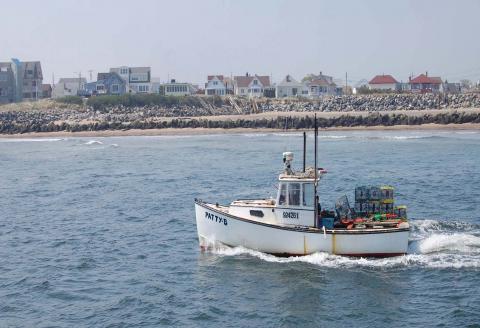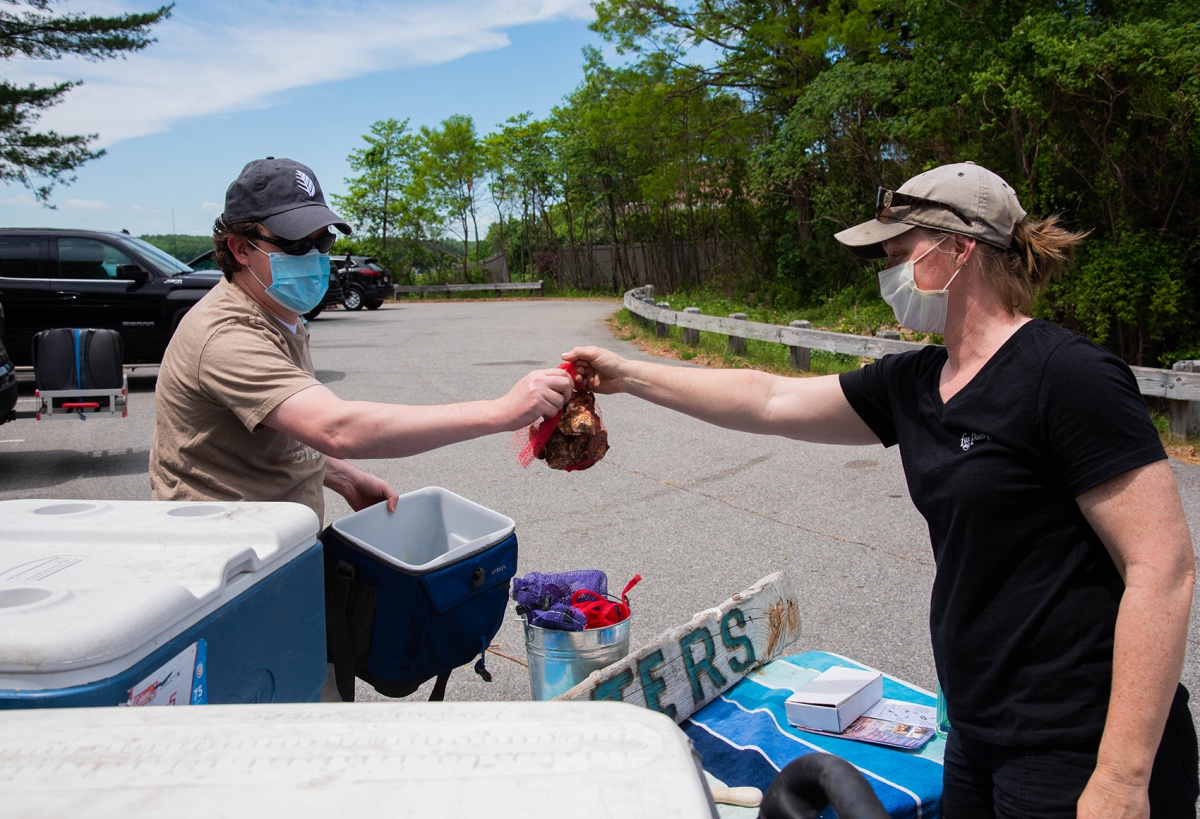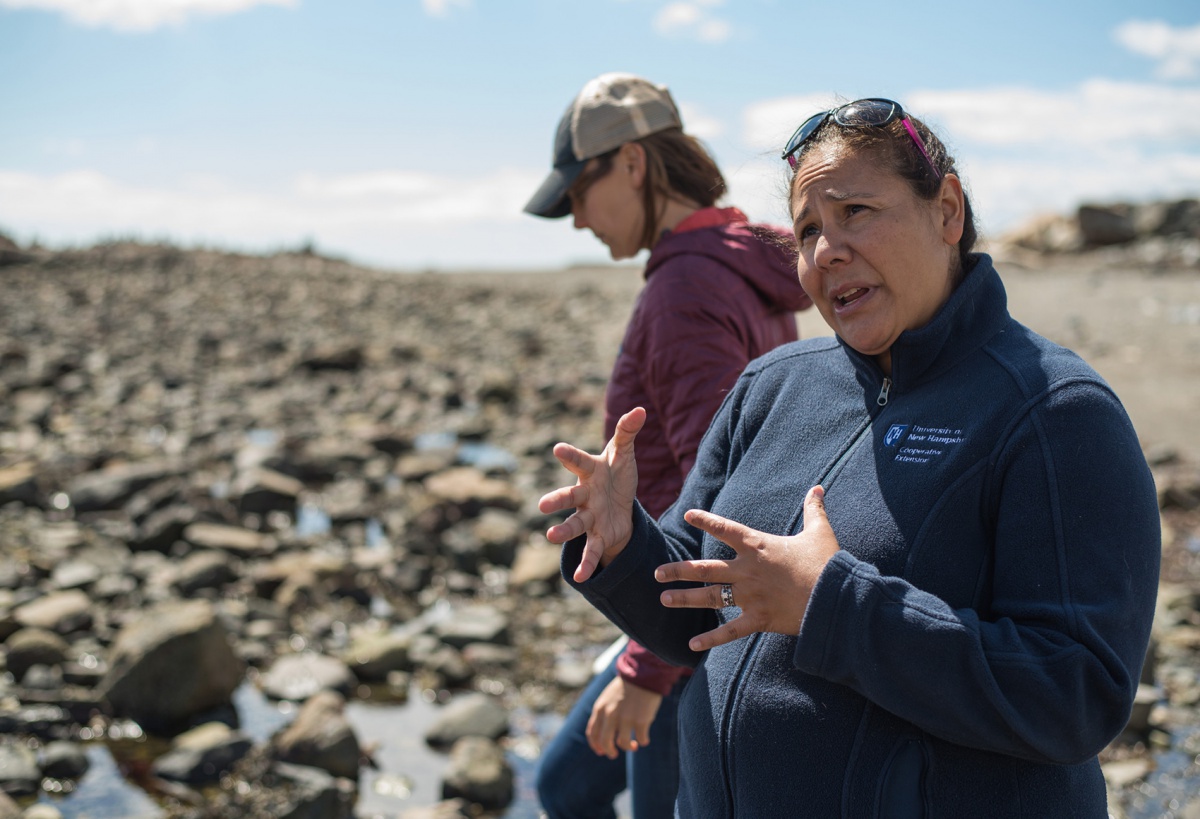New Hampshire Sea Grant Helps Seafood Producers Shift to Direct Sales

Laura Brown has pulled into the parking lot next to the Scammell Bridge in Dover countless times. Off Route 4, the bridge spans a section of waterway where the Bellamy River meets Little Bay — the water that nourishes Brown’s oysters. She’s the owner of Fox Point Oysters, a one-woman operation that raises and supplies locally grown, sustainable shellfish.
But this Saturday is different than most. Instead of pulling on waders or unloading her gear, Brown dons a mask and gloves. She pulls out coolers, a table and a sign that reads “Fresh Oysters” and “Pick up: Today, 11-1.”

It’s May 30, 2020, and the restaurant and wholesale seafood markets that usually buy Brown’s oysters have been greatly impacted by the COVID-19 pandemic, which has caused business closures around the country and world.
Portsmouth lobsterman Dennis Robillard of the F/V Julie Ann III has experienced similarly dry markets for his catch, which he usually sells to lobster dealers year-round. “We’ve had to try to come up with other ways to deal with low prices, no demand or just plain not going fishing,” says Robillard.
Closed restaurants don’t stop seafood lovers from craving local oysters or lobsters, and producers like Brown and Robillard have pivoted from selling to businesses and markets to selling directly to consumers. “People are looking for, I almost want to say, a little adventure,” says Brown. “They're looking for something new to do, a new place to drive to. People are restless.”
Gabriela Bradt, fisheries specialist for UNH Extension and NH Sea Grant, recognized this trend a few weeks into the stay-at-home directive and saw an opportunity to help. “I realized that while there weren’t many [fishermen] doing direct sales yet, it was going to take off. I wanted to be able to connect consumers with fishermen who were being proactive and COVID-19 protocol conscious,” says Bradt.
Bradt created a Local Seafood Finder online map, a resource for New Hampshire residents to learn about local seafood producers and support local seafood businesses affected by market changes. In the weeks following the online map’s launch, hundreds of people accessed the link. She points out that buying off the boat “supports local business, keeps their locally harvested seafood in-state and accessible, and is more eco-groovy as it has a smaller carbon-footprint and you know where your fish came from.”
Bradt also compiled guidance from the Centers for Disease Control and Prevention, NH Fish and Game and the National Sea Grant Network to help the fishing industry understand reporting protocols, permits for off-the-boat and dockside sales and best practices for seafood handling, crew health monitoring, disinfecting and sanitizing.

For Brown and Robillard, the new sales tactic may change their business long-term. While neither see their sales shifting fully to a direct sales model, they’re thinking differently about the future of local oysters and lobsters.
Some of Brown’s new customers are longtime oyster enthusiasts but first-time shuckers, so she walks them through the technique used to open oyster shells for a classic “raw on-the-half-shell” experience, selling oyster knives alongside the bags she fills with bivalves. Customers order online a day ahead and then pick up from Brown in the Scammell Bridge parking lot.
New Hampshire hosts 13 active oyster farms, mostly in the Great Bay Estuary. Buyers in these direct seafood sales leave with more than just fresh seafood. Brown offers lessons about the local environment when customers ask, “Wait, you pulled these out this morning? From there?” she says. “They don't even know where their food comes from. So, that's been awesome, to help teach people.”
“I think it might become a regular ‘order online and pick up at this location’ once-a-week kind of a situation,” says Brown. “If people enjoy it and it's worth it to do it, I will definitely continue.”
Related Resource(s)